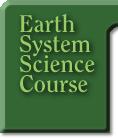Welcome
Welcome
to the High School Earth System Science Course. This 16-week
graduate course has been developed at the Center for Educational
Technologies™, Wheeling Jesuit University. This course
is structured as a collaborative, Problem-Based Learning (PBL)
experience and is held exclusively in an online environment.
The focus
of this course is on you developing Earth system science
knowledge using the Problem-Based Learning (PBL) Model. You
can then apply what you have learned about Earth system
science
and Problem-Based Learning to your own student classrooms
and school curriculum.
Earth
system science thinking begins with the premise that the
land, air, water, and living things on the earth are inextricably
related and affect each other constantly. This view leads
to a rich study of events and situations that draws on the
traditional science disciplines and goes beyond them with
the rigorous thinking required by theory building about the
relationships in the system. Such interdisciplinary, complex,
and rigorous thinking needs to be supported by an instructional
model, such as Problem-Based Learning, that engages each thinker
in bringing the best of his or her knowledge, experience,
and thinking to bear.
Problem-Based
Learning (PBL) is an instructional method using real-world
contexts for in-depth investigations of a subject matter.
PBL activities start with an ill-structured problem that serves
as a springboard to team engagement. In this course, you will
use the PBL Model to assess what is known, to answer questions,
and then to analyze various options before presenting a recommendation
or solution.
This course
is designed to help you articulate and evolve your own knowledge
about Earth system science and to learn to collaborate for
knowledge-building. The methodology, Problem-Based Learning,
begins with complex scenarios to invite a variety of interpretations
that are then investigated and lead to supportable findings
about Earth system science relationships.
The course
structure and weekly activities allow you to use PBL in an
interplay of individual and team work. Your focus is on the
development of your own thinking. The juxtaposition of it
with your teammates' thinking and the other teams' contributions
provide the healthy dissonance you need to evolve your own
thinking.
Overview
The first three weeks of the course will provide an introduction
to the other course participants, your teammates, the facilitator,
Earth system science, and Problem-Based Learning (PBL).
In the
fourth week of the course, you will begin the first of four,
three-week cycles. Each week of the three-week cycle has a
rhythm of individual and team activity to support personal
knowledge growth through individual reflection and team discussion.
The three weeks in each cycle are known as Week A: Teacher
as Problem Solver, Week B: Teacher as Model Builder, and Week
C: Teacher as Designer. You will examine a different event
(Coral Reefs, Tropical Forests, Ozone, Global Change) in each
cycle.
During
Week A and Week B you will do individual and team activities
that teach you how to use the PBL Model in an Earth system
science (ESS) context. Then in Week C you will use what you
have learned about PBL and ESS to design a PBL lesson for
your students.
In the
last week of the course, you will complete an individual final
project.
Course
Goals
This course
is modeled so that you will learn how to use science as inquiry
from the student perspective and then be able to model this
teaching approach in your own classroom. Specifically, you will:
- Evolve your
own knowledge about Earth system science and your skills
in thinking systemically about specific events.
- Learn to develop
strong arguments with hypotheses, assertions, and evidence.
- Develop collaborative
skills for knowledge-building, argument-building, and acting
as a critical friend.
- Develop PBL
experiences that will engage your students in using Earth
system science thinking.
Methodology
To accomplish the goals above, you will act as a problem solver,
model builder, and designer and will:
- collaborate
online in learning teams of four to six teachers
- be
supported and coached by a facilitator and an Earth
scientist
- develop
your own knowledge through weekly reflection and production
- use
rubrics to gauge your progress
Outcomes
As a result of your reflection, research, and collaboration,
you will:
- develop
model building skills for Earth system science thinking
and Problem-Based Learning
- increase
your scholarly knowledge of Earth system science as demonstrated
by mapping your pre-study ideas and then evolving them through
research, reflection, and discussion
- develop
online collaboration skills
- create
four PBL learning experiences for your students
[
Welcome ] [Earth's Spheres] [ Earth
System Science ] [ PBL Model ]
[ Use of Technology ] [ Science
as Inquiry ] [ Participation
] [ Assessment Overview ] [ Course
Sections ]
[ Home ] Intro [ Guide
] [ Outline ] [ Classroom
]
HTML
ce by Chris Kreger
Maintained by ESSC Team
Last updated July 25, 2000
Privacy
Statement and Copyright©
1997-2000 by Wheeling Jesuit University/NASA Classroom of the Future™. All
rights reserved.
|



